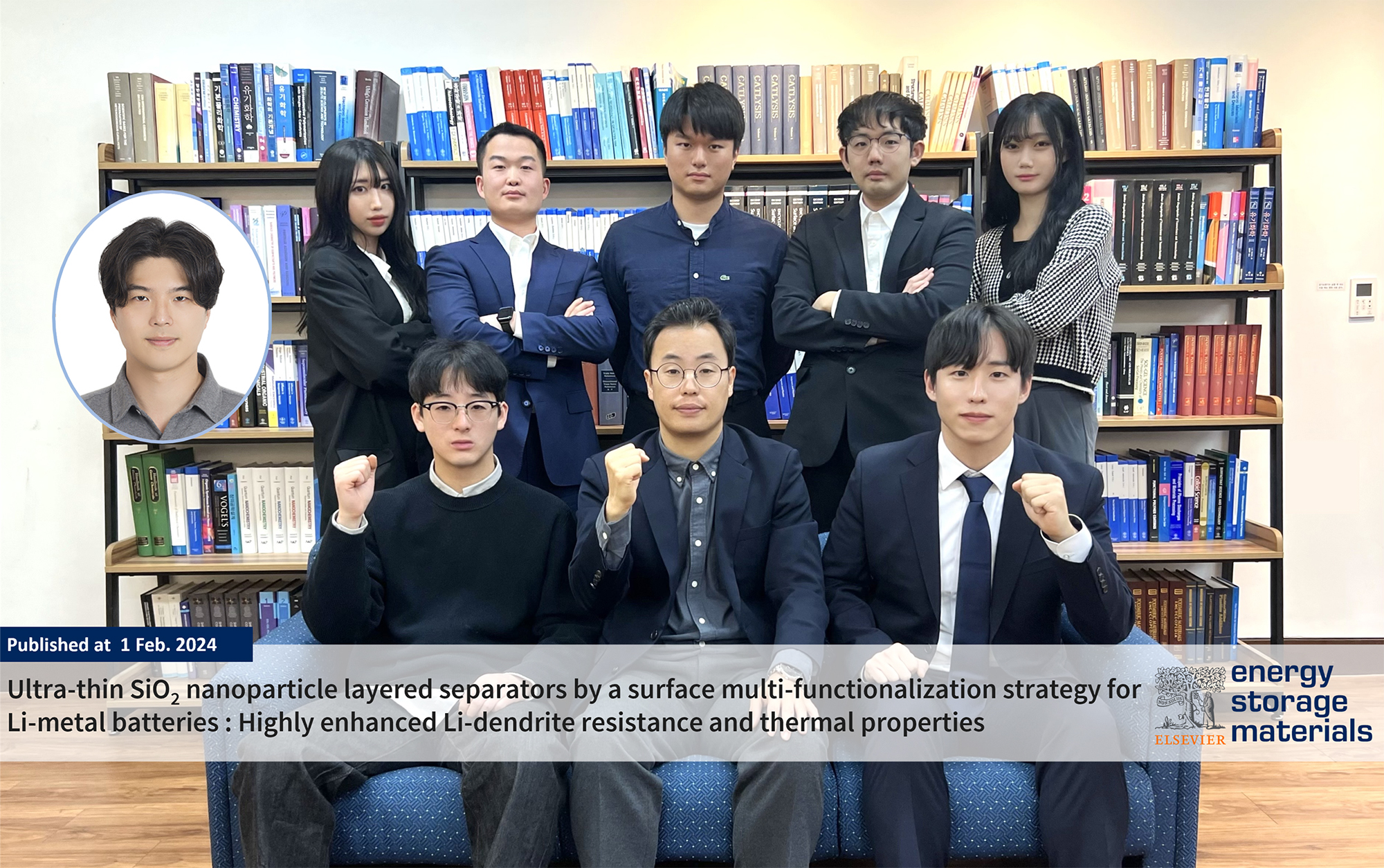연구/산학
PKNU Research 1000
| Cho Kie-Yong' team | Developed technology to increase the lifespan and safety of lithium metal batteries | |||
| 작성자 | 대외협력과 | 작성일 | 2024-06-14 |
| 조회수 | 24012 | ||
| Cho Kie-Yong' team | Developed technology to increase the lifespan and safety of lithium metal batteries | |||||
 |
대외협력과 |  |
2024-06-14 |  |
24012 |
A research team led by pro. Cho Kie-Yong at PKNU has developed technology to increase the lifespan and safety of lithium metal batteries
- developed ultra-thin silica (SiO2) nanoparticle coating technology for battery separators
- published in the international academic journal <Energy storage materials>

△ Diagram showing Li-dendrite suppression of Li-metal cathode through SiO2 nanoparticle coating.
The research team led by professor Cho Kie-Yong (industrial chemistry) at Pukyong National University announced that they had succeeded in developing a separator coating technology that increases the lifespan and safety of lithium metal anodes used in lithium metal batteries, the next generation of batteries.
The team, which includes professor Cho Kie-Yong at Pukyong National University, master's researcher Park Jae-Won, doctoral student Kwon Young-Je, and professor Yoon Jeong-Sik (department of energy and chemical engineering) from Incheon national university, developed an interface control technology for the separator that suppresses the formation of lithium dendrites in lithium metal cathodes.
They succeeded in suppressing the formation of Li-dendrites, which threaten the safety of lithium metal batteries, by modifying the surface of a polypropylene separator using fluorine-based polymers and coating it with ultra-thin silica (SiO2, silicon dioxide) nanoparticles.
Lithium metal cathode is attracting attention as a next-generation cathode that can realize the high capacity of lithium batteries. However, dendrites that occur on the surface of lithium metal not only cause rapid deterioration of lifespan, but also penetrate the separator and cause thermal runaway of the battery, which poses a risk of fire.
Currently, related research on the suppression of lithium dendrites is actively underway, but in the case of inorganic particle coating using existing binders, there were problems such as uneven formation of the coating layer, difficulty in forming an ultra-thin film, and detachment of inorganic particles. Professor Cho Kie-Yong's team developed a method to coat silica nanoparticles very thinly and uniformly by controlling the interface of the separator based on fluorine-based polymers.
The ultra-thin SiO2 nanoparticle coating layer developed by the research team this time is very thin (about 200 nm) and uniformly coated at high density. This makes the transport of lithium ions through the separator uniform, reducing overvoltage caused by a local lack of lithium ions, and it was shown that the growth of dendrite was suppressed. Coating with silica nanoparticles not only improved the mechanical properties, but also suppressed thermal shrinkage of the separator at high temperatures (140 °C), showing excellent high-temperature safety characteristics of the separator.
Researcher Park Jae-Won, the first author of this research paper, explained, "I expect that by developing a high-performance separator for next-generation lithium metal batteries, we will be able to solve the safety problem, which is a major issue in secondary batteries, and contribute to accelerating the commercialization of lithium metal anodes."
The research was supported by the support project for doctoral level researchers of the Ministry of trade, industry and energy and the National research foundation of Korea, and the paper containing the research results, 'ultra-thin SiO2 nanoparticle layered separators by a surface multi-functionalization strategy for Li-metal batteries: highly enhanced Li-dendrite resistance and thermal properties' was published on February 1 in the international academic journal <Energy storage materials> (IF 20.4 / JCR top 2.95%). <Pukyong Today>

△ The research team (professor Yoon Jeong-Sik, Bae Ji-Woo, Kaiyun Zhang, Choi Kyeong-Min, Kwon Young-Je, Lee Min-Jeong from left top row, and Kim Se-Hoon, Cho Kie-Yong from the left bottom row)